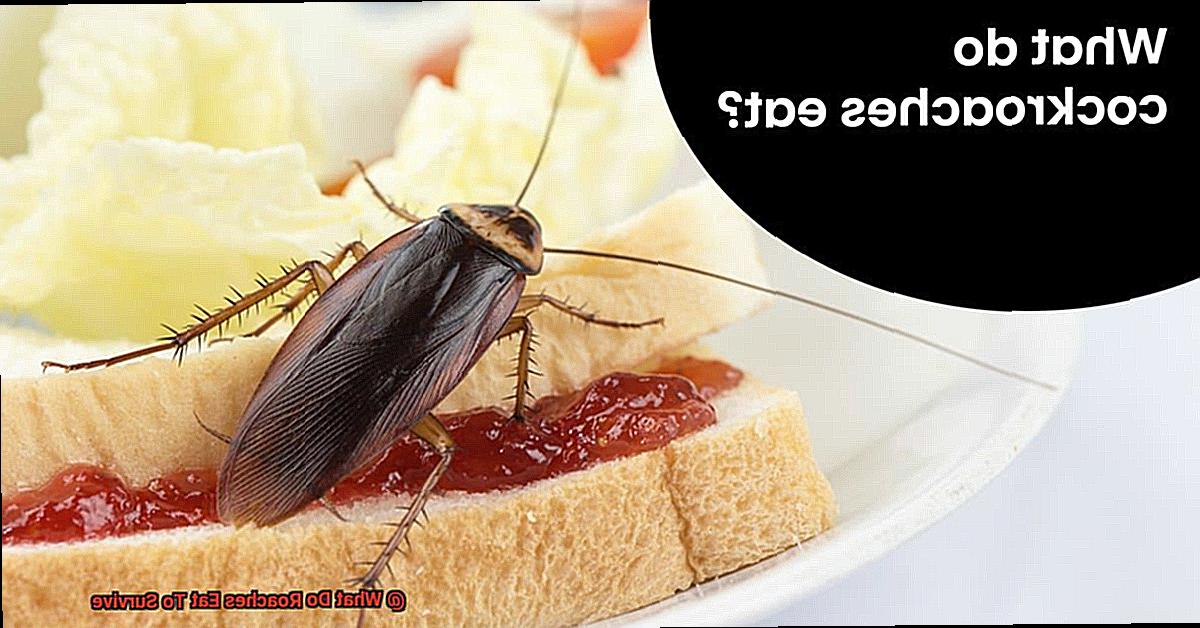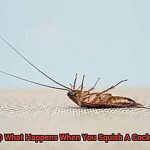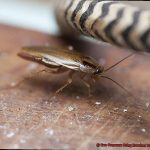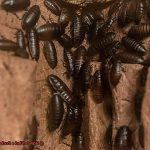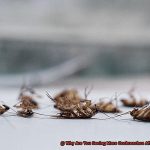Cockroaches are the bane of many homeowners’ existence.
These creepy crawlies can survive almost anything, making them one of the most resilient pests out there. But have you ever wondered what these pesky insects eat to survive?
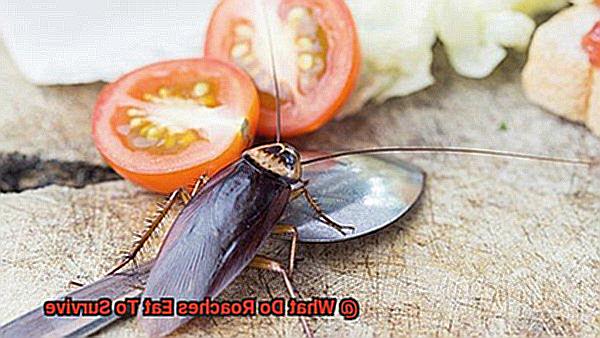
Well, wonder no more. Roaches are omnivorous and will eat just about anything they come across.
From food items to dead insects, feces to leather, wallpaper paste to hair – yes, even hair. – these bugs will chow down on almost anything organic or inorganic.
But it doesn’t end there. Did you know that roaches can also feast on fabrics like clothes and curtains?
And if that’s not enough to make your skin crawl, they can even eat soap. As a homeowner, it’s crucial to keep your living space clean and tidy because any leftover crumbs or food debris can attract these unwanted visitors.
Knowing what roaches eat is essential knowledge for getting rid of them once and for all. So, let’s dive into the fascinating world of cockroach feeding habits together.
Let’s start now.
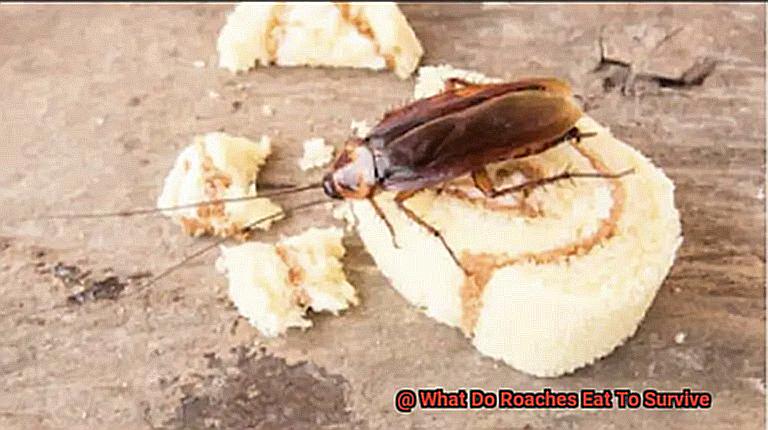
Roaches as Omnivores
Contents
Roaches are the ultimate survivors, thanks to their impressive omnivorous diet.
These versatile pests can consume almost anything they can find, ranging from decaying organic matter to human food scraps. Roaches are not picky eaters and have a diverse palate that allows them to thrive in almost any environment.
When food is scarce or the population is high, roaches exhibit cannibalistic behavior. This means that if there isn’t enough food to go around, the population may start eating each other.
Talk about being resourceful. The secret to their resiliency lies in their unique digestive system.
Roaches have a symbiotic relationship with bacteria in their gut that helps break down and extract nutrients from almost anything they consume. This means that they can go up to a month without food, but they can only survive about a week without water.
Roaches are also highly adaptable when it comes to their diet. Studies have shown that they can develop a taste for unusual items such as toothpaste and soap.
German cockroaches, for example, are notorious for this strange taste preference. This just goes to show how resourceful these pests can be when it comes to finding food.
To prevent a roach infestation in your home, it’s crucial to eliminate their food sources by keeping your home clean and free of clutter.
Roaches have a special preference for starchy and sugary foods such as bread, cereal, and sweets, so sealing all food sources and cleaning up crumbs and leftovers regularly will go a long way in deterring these pesky creatures from taking up residence in your home.
These factors make them one of the most resilient pests out there.
How Long Can Roaches Go Without Food?
The length of time these pesky bugs can go without food depends on various factors such as species and environmental conditions.
On average, cockroaches can survive for up to a month without food. However, some species like the American cockroach can push it to three months.
Conversely, the German cockroach can only last a few weeks without a meal. While roaches can hold out without food for quite some time, water is another story.
Roaches need water to live and can only survive for a few days without access to it. That’s why you’ll often find them lurking in areas with high moisture levels like bathrooms and kitchens.
If you want to get rid of these resilient pests, cutting off their access to food and water sources is essential. Doing so will make it difficult for them to survive and reproduce.
Additionally, you may consider using bait traps or insecticides to eliminate an existing roach infestation entirely. In summary, roaches are true survivors, capable of going weeks or even months without food.
Roaches Feeding on Human Waste and Garbage
These scavengers will eat almost anything they can find, including human waste and garbage.
While they can survive for up to a month without food, they require water to live. In the absence of other food sources, roaches may turn to human waste and garbage as a source of sustenance.
But why are roaches so attracted to human waste? It’s because human waste provides them with vital nutrients such as protein, carbohydrates, and fats.
This is why it’s important to keep your bathroom and toilet clean and properly sealed. If you don’t dispose of your waste properly, you may be providing a breeding ground for roaches.
Garbage is another common food source for roaches. They are drawn to the smell of rotting food and will often infest garbage cans or dumpsters.
To prevent this, make sure you dispose of your garbage properly and keep your trash cans sealed tightly. Roaches can also feed on dead insects, including dead cockroaches.
So it’s important to remove any dead bugs from your home promptly. While roaches may feed on human waste and garbage when other food sources are scarce, this is not their preferred food source.
They would much rather feast on fresh fruits, vegetables, and meats. So if you want to prevent roaches from infesting your home, it’s important to keep your living space clean and free of clutter.
Make sure all food is stored in airtight containers and clean up any spills promptly. Additionally, check for any leaks or standing water in your home, as roaches require water to survive.
By taking simple steps like disposing of garbage properly and sealing up leaks, you can help keep these unwanted visitors at bay.
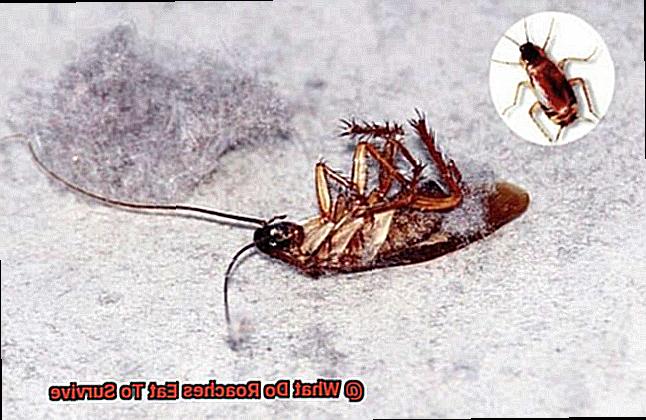
Cannibalism in Roach Infestations
.
With the best prevention methods, cockroaches may still find a way into your home, and when they do, cannibalism may occur.
Cannibalism in roach infestations is not uncommon. When there is a shortage of food, cockroaches will eat each other.
In fact, some species of cockroaches have been known to prefer their own kind over other food sources. This behavior isn’t limited to just adult cockroaches either.
Nymphs will also consume each other when food is scarce. As a result, there can be a decrease in population density and a shift in the age structure of the population.
But that’s not all – cannibalism can also have a negative impact on the health of the surviving cockroaches. If a cockroach consumes another that is infected with a disease or parasite, it can become infected as well.
This can lead to the spread of disease within the population. It’s important to note that while cannibalism may occur in roach infestations, it’s not a long-term solution for survival.
Cockroaches require a consistent source of food and water to thrive, and cannibalism only serves as a temporary solution during times of scarcity. So what does this mean for you?
Prevention is key. By keeping your home clean and free of clutter, disposing of garbage properly, and sealing up leaks, you can reduce the risk of a roach infestation altogether.
Eliminate Food Sources to Get Rid of Roaches
Cockroaches are scavengers and will eat almost anything to survive, but they need water to live. That’s why we need to eliminate all possible food sources in our homes.
First and foremost, clean up any crumbs, spills, and food debris immediately. Roaches are attracted to anything edible, so don’t forget to store your food in airtight containers or in the refrigerator.
Even pet food needs to be stored away. Don’t leave it out overnight, and clean their bowls regularly.
Make sure to take out the trash regularly too. Roaches can survive on non-food items such as paper, glue, and soap residues, so keep all surfaces clean and free of clutter.
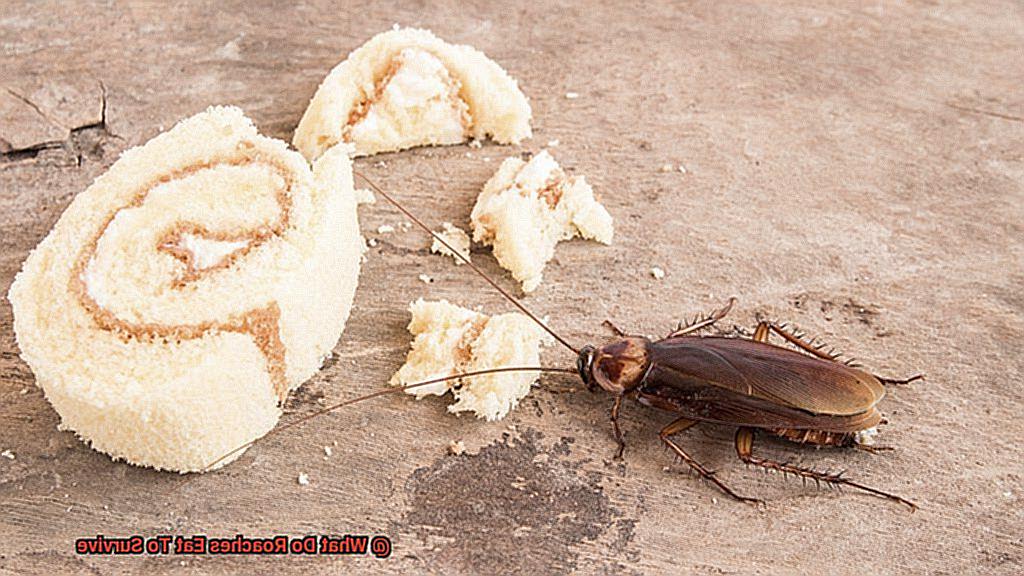
Don’t forget to clean under sinks, behind appliances, and in other hidden corners where roaches love to hide. If you have a garden or outdoor area near your house, keep it clean and tidy too.
Roaches can feed on decaying plant matter and other insects. So make sure to clear away any debris or decaying plants.
Now that we’ve eliminated their food sources let’s talk about baits and traps. Baits contain poison that roaches will take back to their nest, killing the entire colony.
Traps are also useful for catching individual roaches. In conclusion, by keeping your home clean and tidy, you’ll make it less attractive for these pests to settle in and multiply.
Eliminating food sources is an essential step in getting rid of roaches in your home.
H_HxwLHX8mc” >
Common Foods That Attract Roaches
Roaches are not picky eaters, but some foods are more alluring than others.
Sugary treats like cakes, cookies, and candy are like catnip to these critters. They can detect the scent of sugar from a distance and will swarm towards it eagerly.
Starchy foods like bread, pasta, and rice are also on the menu for roaches. These foods provide them with the carbs they need to survive.
Fatty foods like meat, cheese, and butter are another favorite for roaches. They provide the protein and fat needed to keep these pests thriving.
Pet food is yet another delicacy for roaches. It’s often left out for long periods of time, providing them with a constant source of food.
Garbage is also a treasure trove for these scavengers. Roaches love munching on food scraps and decomposing organic matter.
To prevent roaches from being attracted to your home’s food supply, it’s essential to store your grub in airtight containers. Sealing up your treats can make them less enticing since roaches can detect the scent of sugar from a distance.
Don’t forget to clean up crumbs and spills immediately too. Roaches won’t turn down a stray morsel of bread or cookie crumbs.
But what about our furry friends? Roaches will even chow down on pet food left out for extended periods.
That’s why it’s important to clean your pet’s dishes regularly and store their food in sealed containers when they’re not eating. It’s like cutting off the enemy’s supply lines.
Lastly, roaches are scavengers and will eat almost anything they can find in the garbage. Food scraps and decomposing organic matter are especially tempting treats for these critters.
Also Read: How Long Can Cockroaches Live Without Food? – All About Roaches
Conclusion
In conclusion, roaches are the ultimate survivors who will feast on just about anything they come across.
Their omnivorous diet includes everything from food items to dead insects, feces to leather, wallpaper paste to hair. They can even munch on fabrics like clothes and curtains and eat soap.
To keep these unwanted guests out of your home, it’s crucial to eliminate their food sources by keeping your home clean and tidy. Roaches have a unique relationship with gut bacteria that helps them extract nutrients from almost anything they consume.
This means that they can survive up to a month without food but only a week without water. To thrive, roaches require a consistent source of food and water, making it essential to eliminate any possible sources in our homes.
Keeping your home spick and span is key to preventing roach infestations. Dispose of garbage properly, store food in airtight containers or in the refrigerator, clean up spills immediately, take out the trash regularly, and clean under sinks behind appliances and other hidden corners where roaches love to hide.
These simple steps can significantly reduce the risk of an infestation altogether. If you already have a roach problem, bait traps or insecticides may be necessary for complete elimination.

